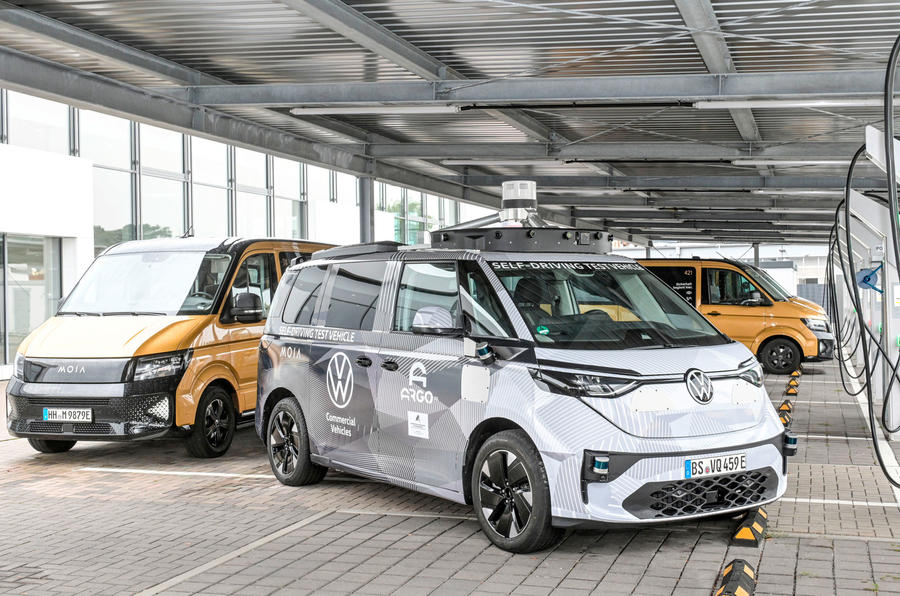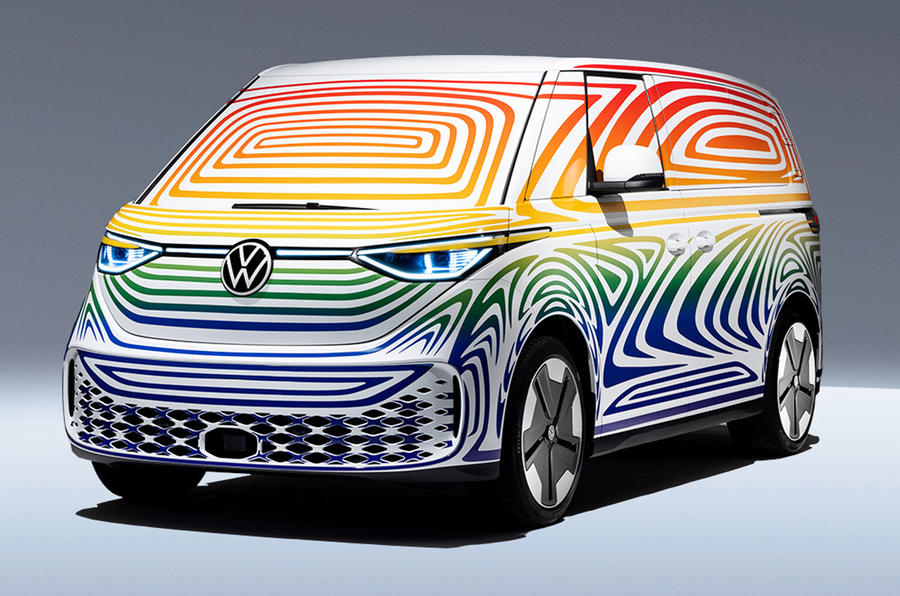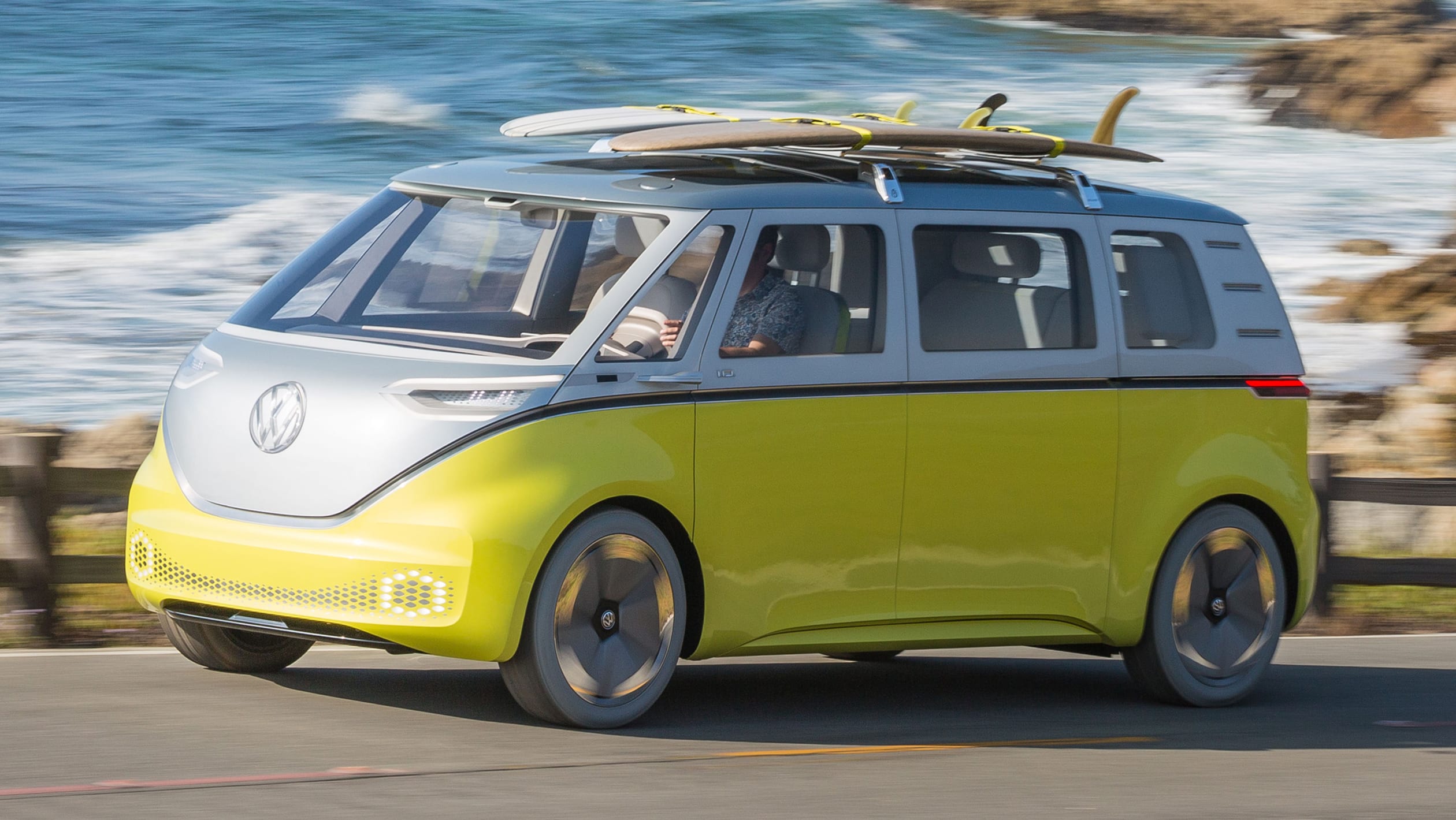German car maker and Argo AI take the next step with autonomous ride-sharing scheme to create the “world’s best driver”.
Volkswagen has outlined plans to start a ride-sharing scheme of autonomous-capable ID Buzzes in the next four years as a precursor to a range of commercially offered EVs with advanced self-driving functionality.
A prototype version of the self-driving MPV was shown last month in Munich, which is one of several locations playing host to Volkswagen and partner firm Argo AI’s comprehensive autonomous vehicle testing programme.
Trials are currently being held non-stop at a dedicated test track near Munich airport, but the test vehicles will soon be deployed on public roads throughout the city as the firm ramp up to commercialising their new technology.
The scheme will be run by Volkswagen’s Moia mobility division, which runs a ridesharing service in Hamburg and Hanover, Germany, using a bespoke electric minibus, and before the pandemic was also conducting a UK pilot scheme.
The Volkswagen Group will invest some £1.9 billion (AUD$2.96bn) into Argo AI as part of their partnership deal, but the autonomous vehicle trial programme is a wholly collaborative operation. Argo AI founder and CEO Bryan Salesky said the US company’s engineers are working “hand in hand” with Volkswagen Group product developers.
The Volkswagen Group’s push for autonomous vehicles is a central part of its ambitious New Auto strategy, under which it is seeking to grow revenues with a focus on EVs and software services. By 2030, it hopes to have transformed into a “mobility company” from purely a car manufacturer.
“Autonomous driving has huge potential for the industry,” said Volkswagen Group CEO Herbert Diess. “We think that until 2030, the mobility industry can double in size because of autonomous driving.”
Projects like that under way with Argo AI are crucial to achieving that goal, as a fully developed autonomous vehicle ecosystem could eventually give the Volkswagen Group a revenue stream comparable to that currently resulting from traditional car sales.
However, Diess remains adamant that conventional cars will continue to form the backbone of the firm’s output, because “people driving or being driven in owned, leased, shared or rented cars will still account for 85 per cent of mobility, and those 85 per cent will be at the core of our business”.
The trial process’s 2025 end date won’t represent a definitive conclusion. In fact, said Salesky: “The world underestimates how complex this is. It’s a multi-generational problem that I’m working on and our kids will be working on. It will probably never really be done.”
He emphasised that deals such as those Argo AI has with the Volkswagen Group and Ford are key to the development and roll-out of autonomous driving technology, giving large manufacturers access to new tech and in return providing small start-ups with the means to scale up their offerings.
“Everything we do is with the intention of scaling it out,” he elaborated, explaining that the project’s ultimate aim is to create “the world’s best driver”.
As well as the wide-reaching usability benefits afforded by autonomous vehicles, there is also the safety aspect. A computer isn’t susceptible to tiredness or distraction like a human, so they should theoretically cut crash rates.
However, the technology has some way to go before it will be ready for a commercial roll-out. As much as these early trials are being carried out with the aim of fine-tuning the technology, they are also essential for the artificial intelligence system to learn how to behave on public roads.
Busy urban environments are much more challenging for such systems than motorways, but as Volkswagen sees a larger customer base for self-driving cars in cities, it is “going for the highest complexity” possible, according to Diess. Salesky agreed, predicting that autonomous ride-sharing will be of most interest to people in cities who are less attracted to the idea of private car ownership, so the system must be able to cope with pedestrians, bicycles, buses and other urban hazards.
He also noted that developing the system in this way will allow it to be eventually used by urban delivery companies as well as passenger-carrying services. That’s why the ID Buzz is being used for the trials: its flexible interior and all-electric powertrain make it ideal to investigate different use cases. The prototype displayed at Munich showcased Argo AI’s hardware, including a roofmounted lidar sensor it claims is the “farthest-reaching” in operation, with an ability to see more than 400 metres and identify complex hazards such as matt-black cars.
Eventually, Volkswagen will extend its autonomous driving programme to cars for private use, with the Project Trinity sedan being designed “from the inside out”, such is its emphasis on automation. When it launches in 2026, it will have level-three autonomous functionality, enabling a human driver to take over, before being upgraded to level four in around 2030.
Private cars capable of full autonomy are dubbed “time machines” by Volkswagen, because time spent driving will instead be available for working, relaxing or socialising in its vehicle.
Felix Page







